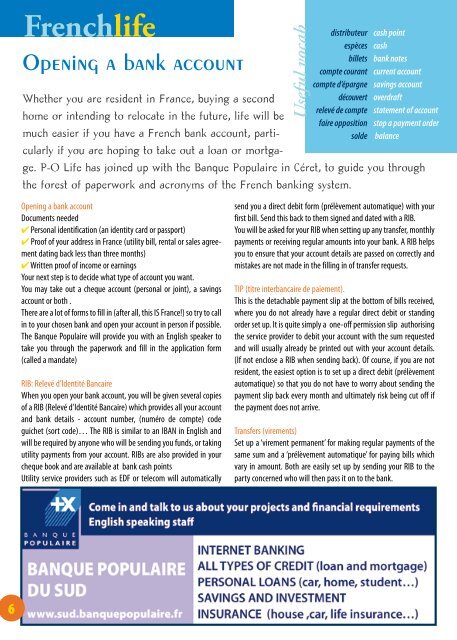You also want an ePaper? Increase the reach of your titles
YUMPU automatically turns print PDFs into web optimized ePapers that Google loves.
6<br />
Frenchlife distributeur<br />
espèces<br />
Opening a bank account<br />
Whether you are resident in France, buying a second<br />
home or intending to relocate in the future, life will be<br />
much easier if you have a French bank account, parti-<br />
cularly if you are hoping to take out a loan or mortga-<br />
ge. P-O <strong>Life</strong> has joined up with the Banque Populaire in Céret, to guide you through<br />
the forest of paperwork and acronyms of the French banking system.<br />
Opening a bank account<br />
Documents needed<br />
4 Personal identification (an identity card or passport)<br />
4 Proof of your address in France (utility bill, rental or sales agreement<br />
dating back less than three months)<br />
4 Written proof of in<strong>com</strong>e or earnings<br />
Your next step is to decide what type of account you want.<br />
You may take out a cheque account (personal or joint), a savings<br />
account or both .<br />
There are a lot of forms to fill in (after all, this IS France!) so try to call<br />
in to your chosen bank and open your account in person if possible.<br />
The Banque Populaire will provide you with an English speaker to<br />
take you through the paperwork and fill in the application form<br />
(called a mandate)<br />
RIB: Relevé d’Identité Bancaire<br />
When you open your bank account, you will be given several copies<br />
of a RIB (Relevé d’Identité Bancaire) which provides all your account<br />
and bank details - account number, (numéro de <strong>com</strong>pte) code<br />
guichet (sort code)… The RIB is similar to an IBAN in English and<br />
will be required by anyone who will be sending you funds, or taking<br />
utility payments from your account. RIBs are also provided in your<br />
cheque book and are available at bank cash points<br />
Utility service providers such as EDF or tele<strong>com</strong> will automatically<br />
Useful vocab<br />
billets<br />
<strong>com</strong>pte courant<br />
<strong>com</strong>pte d’épargne<br />
découvert<br />
relevé de <strong>com</strong>pte<br />
faire opposition<br />
solde<br />
cash point<br />
cash<br />
bank notes<br />
current account<br />
savings account<br />
overdraft<br />
statement of account<br />
stop a payment order<br />
balance<br />
send you a <strong>direct</strong> debit form (prélèvement automatique) with your<br />
first bill. Send this back to them signed and dated with a RIB.<br />
You will be asked for your RIB when setting up any transfer, monthly<br />
payments or receiving regular amounts into your bank. A RIB helps<br />
you to ensure that your account details are passed on correctly and<br />
mistakes are not made in the filling in of transfer requests.<br />
TIP (titre interbancaire de paiement).<br />
This is the detachable payment slip at the bottom of bills received,<br />
where you do not already have a regular <strong>direct</strong> debit or standing<br />
order set up. It is quite simply a one-off permission slip authorising<br />
the service provider to debit your account with the sum requested<br />
and will usually already be printed out with your account details.<br />
(If not enclose a RIB when sending back). Of course, if you are not<br />
resident, the easiest option is to set up a <strong>direct</strong> debit (prélèvement<br />
automatique) so that you do not have to worry about sending the<br />
payment slip back every month and ultimately risk being cut off if<br />
the payment does not arrive.<br />
Transfers (virements)<br />
Set up a ‘virement permanent’ for making regular payments of the<br />
same sum and a ‘prélèvement automatique’ for paying bills which<br />
vary in amount. Both are easily set up by sending your RIB to the<br />
party concerned who will then pass it on to the bank.






